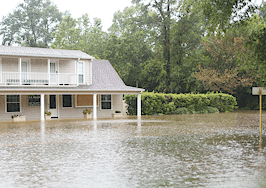A bipartisan budget deal signed into law Friday morning following a six-hour government shutdown will briefly extend the National Flood Insurance Program for a few weeks, while lawmakers race to reform the ailing, 49-year-old insurance plan through legislation currently stalled in the Senate.
The extension until March 23 was among a half-dozen small victories for the real estate industry buried inside the 600-page budget bill, and the National Association of Realtors (NAR), the industry’s largest trade group and its most powerful lobbying body, is taking credit.
Besides infrastructure and disaster relief funding–which are expected to spur new development — the bill will now extend a series of mortgage- and energy-related tax credits thought to be in jeopardy after their exclusion from last year’s tax overhaul.
“The National Association of Realtors is glad Congress came together to extend funding for the federal government, as well as extend retroactively for 2017 tax relief from debt forgiveness, the deductibility of mortgage insurance premiums and several energy-efficiency related provisions, which provides long-term budget certainty and valuable tax breaks for homeowners,” said NAR President Elizabeth Mendenhall in an emailed statement. “While we avoided another lapse in the National Flood Insurance Program, we now urge Congress to speed passage of legislation to reauthorize and reform the program for a longer term and end the current stopgap approach.”
Long a priority for NAR, the National Flood Insurance Program earned a reprieve in November, when lawmakers in the House reauthorized the plan and passed the “21st Century Flood Reform Act,” which, among other provisions, included $1 billion to elevate, buy out or mitigate the riskiest of an estimated 5 million policyholders.
Under the new legislation, premiums, which on average cost homeowners $650 annually but can spin out of control in coastal regions, would be capped at $10,000. Additionally, new mapping technology authorized in the new legislation would reduce rates by calculating the true risk of flooding farther inland.
The bill, however, has languished in the Senate since Nov. 14, when House lawmakers voted in favor of it, 237-189, despite opposition from Democrats and officials on both sides of the aisle representing coastal districts, who claim premiums on high-risk properties could skyrocket. Currently, the bill is pending in the Senate Banking Committee, according to a NAR official.
“NAR is urging the Senate to act quickly and will continue working with members of Congress to ensure that the NFIP does not shut down in the interim,” said the group’s spokesperson.
Meanwhile, a half-dozen tax credits thought to be in danger of extinction, were also extended retroactively for the 2017 tax year, many of them boons for first-time homebuyers and homeowners facing foreclosure in 2017.
Chief among the extensions are for mortgage debt forgiveness, which allows taxpayers to exclude income from the discharge of debt on a residence, and for deductions on mortgage insurance premiums, whereby taxpayers can deduct insurance premiums they paid as part of their mortgage, according to a National Association of Realtors release issued on Friday.
Other mortgage- and energy-related credits extended for the 2017 tax year include:
• Deduction for Energy Efficiency Improvements on Commercial Buildings: Extends the deduction for the cost, up to $1.80 per square foot, of energy-efficient commercial property. Increasing the efficiency of commercial buildings not only helps the environment, it saves owners and tenants money they can use to grow their business.
• Non-business Energy Property Credit: 10 percent of amounts paid for qualified energy efficiency improvements—like energy-saving roofs, windows, skylights, and doors—and 100 percent of qualified energy property, including high-efficiency water heaters, air conditioning units, and furnaces with respect to the taxpayer’s residence
• Residential Energy Efficiency Property Credit: Extends and phases down the temporary components of the section 25D residential energy property credit for fuel cells, distributed wind property, and geothermal heat pumps
• Credit for energy-efficient new homes: extends the $1,000-$2,000 credit for construction and sale of qualified new energy-efficient homes.
The budget, however, also threatens to send mortgage rates reeling, thanks to a $300 billion spending boost that will nudge government debt to nearly $1 trillion in 2018, setting in motion a ripple effect that could prompt the U.S. Treasury to issue a flood of new 10-year bonds.
“As it directly relates to real estate, it could mean that we will see mortgage rates rise at a modestly faster rate than most economists, including myself, had anticipated,” said Matthew Gardner, chief economist at Windermere, the Seattle-based real estate company. “I’m not saying we’re going to be at 6 percent in a year. However, if we do start seeing inflation, one thing bonds hate more than anything else is inflation—end of story.”
Email Jotham Sederstrom













